Schools for Wisdom: Personalized Project-Based Learning
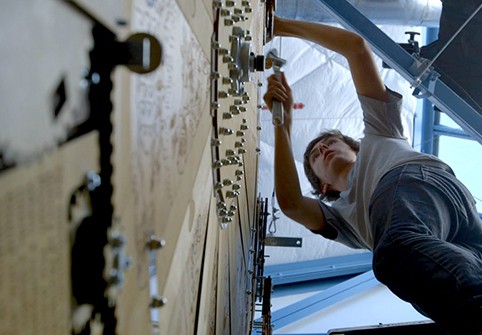
The new documentary Most Likely to Succeed follows the journey of students at High Tech High (HTH), one of the best high schools in America. Students participate in complex integrated team-based projects; they produce extraordinary art, film, books, and artifacts of their studies.
David Brooks reviewed the documentary and observed that the movie appears to be “about relationships, not subject matter.” He suggests the thesis of the film is “to take content off center stage and to emphasize the relational skills future workers will actually need: being able to motivate, collaborate, persevere and navigate through a complex buffet of freelance gigs.”
Brooks laments the lack of conventional study habits. If he means memorizing loads of stuff the night before a test, he’s right. What he doesn’t fully acknowledge is that students at schools like HTH (see profiles of 20 more) take on complex challenges, work on diverse teams and emerge ready for a project-based world.
Brooks worries that schools like HTH skip big stretches of history and other subjects. He longs for factual acquisition, pattern recognition, and the “mental reformation” where information becomes knowledge. I’m sympathetic to his argument that a body of knowledge is a necessary step on the path to wisdom, but memorizing stuff for a test isn’t laying the foundation for wisdom.
High Tech High was founded by Larry Rosenstock, perhaps the most nuanced thinker about secondary education in America. Rosenstock thinks we should ask students to use their head, use their hands, make things, and think about things; that students should spend more time on production technology than consumption technology. Rosenstock thinks school be about be revealing and uncovering–not just covering content. He thinks students should do field work and demonstrate their learning.
It’s true that HTH students cover less material than cram schools but they trade superficial knowledge for deep understanding. Scan HTH projects and you’ll appreciate that (compared to that chem quiz cram that you did) HTH experiences are memorable for a lifetime.
What might make a conservative like Brooks nervous is that Rosenstock encourages perplexity–a constant state of reinventing. He suggests, “Keep tinkering with your school, taking things apart and putting back together. Let people mix it up, keep it interesting. Balance stability versus churning–not unstable but not stuck.”
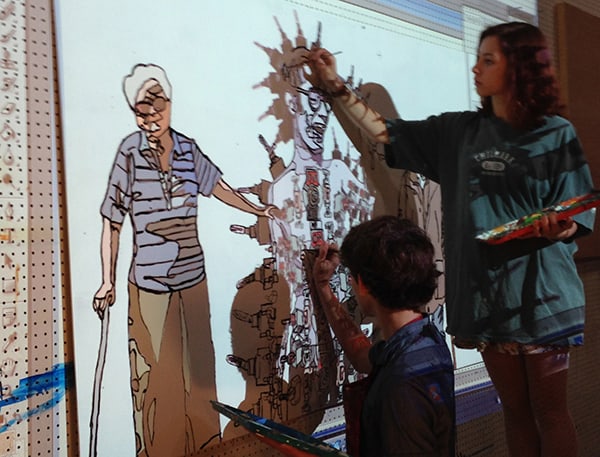 HTH is the best art school in America (based on a couple thousand school visits) because they challenge disciplinary boundaries and mash up calculus and math, social studies and engineering, theatre and history, literature and ecology. They inject art into everything. This lack of convention may be startling to Brooks, but it creates one of the most vibrant intellectual environments I’ve ever experienced.
HTH is the best art school in America (based on a couple thousand school visits) because they challenge disciplinary boundaries and mash up calculus and math, social studies and engineering, theatre and history, literature and ecology. They inject art into everything. This lack of convention may be startling to Brooks, but it creates one of the most vibrant intellectual environments I’ve ever experienced.
The visceral, collaborative learning at HTH makes knowledge tangible and useful. Perhaps the movie “underemphasizes intellectual virtues” but High Tech High certainly doesn’t.
Personalized PBL. In addition to High Tech High, a generation of new schools are combining the historical strengths of project-based learning (engagement and integration) and personalized learning (individualized skill fluency).
Summit Public Schools in the Bay Area (which is accepting applications for school partners) uses digital playlists to develop knowledge and skills and to prepare students to engage in challenging projects.
New Tech Network is a national network of project-based schools that share a common learning platform. They continue to improve the skill-building capacity to enable students to fully benefit from challenging project-based work. As a network, they support public school districts that “create vibrant learning organizations where students graduate ready for college and career.”
The six regional next-gen school funds will develop more than 50 schools combining individualized skill building and high engagement projects. Given their balanced focus on college and career readiness, this new generation of schools appears to be preparing young people for their path to wisdom.
For more see:
- Most Likely to Succeed: The Future of School Tour
- Most Likely to Succeed: A Film About What School Could Be
- High Tech High: Student Engagement Leads to Deeper Learning
Stay in-the-know with all things EdTech and innovations in learning by signing up to receive the weekly Smart Update.




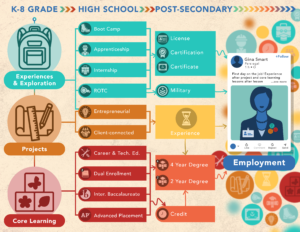
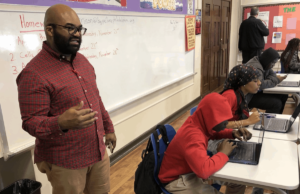

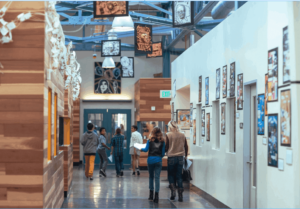
Tom Vander Ark
Renee Boss (on Twitter): Thank you for this article. I think if people would pair #mltsfilm & book together they would feel less concerned about content (see book here: http://www.amazon.com/gp/product/1501104314?keywords=most%20likely%20to%20succeed&qid=1445120580&ref_=sr_1_1&s=books&sr=1-1
Andrew Frishman
Thank you Tom for sharing this insightful response. At Big Picture Learning schools (www.bigpicture.org) we support a similar line of reasoning and extend the learning that students do outside of the classroom walls. Rhrough our robust internship programs we enable students to start with their interests and passions and pursue them into authentic learning experiences in with organizations and businesses in their communities. For an example see here - http://www.edutopia.org/is-school-enough-real-world-internship-video